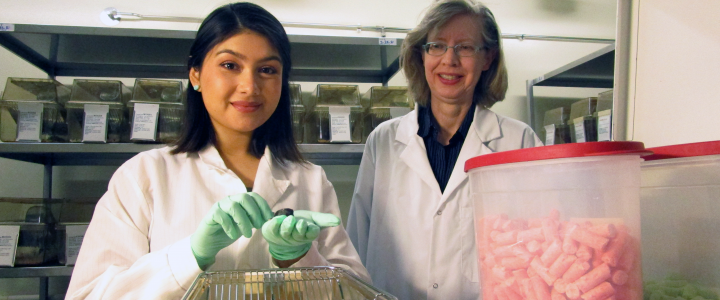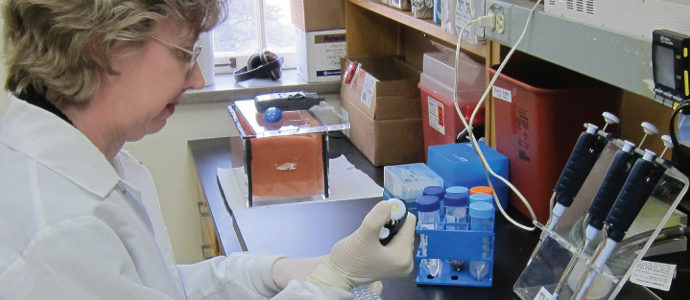Are there critical periods in Fragile X syndrome? Will treatment work in adults as well as in children? This team aims to answer these questions.
Read moreUniversity of Wisconsin
Identifying Cellular and Molecular Signatures in Human Neurons That Distinguish Fragile X Syndrome Patients with Divergent EEG Profiles

Why is it so hard to find the right medications to help people with Fragile X syndrome? Just as Fragile X affects individuals differently, medications do as well. This project aims to bring personalized medicine to Fragile X syndrome.
Read morePreclinical Testing of High Fat/Low Carb Diets in Fragile X Mice and Cells

With a $90,000 research grant from FRAXA, Dr. Cara Westmark’s team will use mice to determine if more palatable Atkins-type diets can improve sleep and boost learning skills for those with Fragile X syndrome.
Read moreKetogenic Diet Eases Symptoms in Fragile X Male Mice

The Westmark laboratory continues to study sleep and rest-activity cycles in Fragile X mice as a potential outcome measure that correlates between preclinical and clinical research. The analysis of sleep EEG in the mice has proven more labor intensive than they anticipated, but the team is collaborating with Dr. Rama Maganti’s laboratory at UW-Madison on the development of computer scrips to speed up the analysis.
Read moreTargeting Mitochondria in Human Fragile X Syndrome Neurons

FRAXA Research Foundation has awarded a $90,000 research grant to principal investigator Dr. Xinyu Zhao and postdoctoral fellow Dr. Minjie Shen at the University of Wisconsin. They are investigating whether drugs which boost mitochondria — which provide the energy for cells — could treat Fragile X syndrome. Dr. Zhao explains in this video.
Read morePreclinical Testing of Sleep-Wake Patterns as an Outcome Measure for Fragile X

FRAXA Research Foundation awarded $122,000 over 2016-2018 to Dr. Cara Westmark at the University of Wisconsin at Madison for studies of sleep disorders in Fragile X syndrome.
Read moreDeveloping IPS cells to Screen Drugs which can Reactivate the FMR1 Gene

With $146,000 grant from FRAXA Research Foundation over 2012-2013, Drs. Anita Bhattacharyya and Xinyu Zhao at the University of Wisconsin developed a new mouse model of Fragile X syndrome which will enable testing of gene reactivation and gene therapy approaches to treatment. They transplanted human Fragile X neural cells differentiated from induced pluripotent stem cells into brains of neonatal mice and then testing for FMR1 reactivation. In 2015, The John Merck Fund assumed support for this work with a generous grant of $750,000 to the scientists. Results published.
Read moreAb-Mediated Translation in Fragile X Syndrome

With a $120,000 grant from FRAXA Research Foundation during 2011-2012, Dr. Cara Westmark at the University of Wisconsin explored the role of AbPP as a potential treatment option for fragile X. AbPP produces b-amyloid which is over-expressed in Alzheimer’s disease (AD) and Down syndrome.
Read moreRole of JNK in FMRP Regulated Translation in Fragile X Syndrome

With a $90,000 grant from FRAXA Research Foundation over 2 years, Dr. Michael Wilhelm and his team at the University of Wisconsin studied a protein known as JNK, which is observed to be abnormally regulated in Fragile X. Like FMRP, it is involved in regulating dendritic protein synthesis, and so it may be a target for drug therapy in Fragile X.
Read moreAltered Cyclic AMP Signaling in Fragile X

With $125,000 grant from FRAXA Research Foundation over 2006-2008, Dr. Anita Bhattacharyya at the University of Wisconsin Waisman Center investigated abnormalities in cyclic AMP signaling in Fragile X syndrome. Results published.
Read moreUsing Fenobam to Reduce APP and Abeta in Fragile X Mice

With a $130,000 grant from FRAXA Research Foundation over 2008-2009, Drs. James Malter and Cara Westmark at the University of Wisconsin studied the relationship between the Fragile X protein FMRP and APP, a protein important to the pathology of Alzheimer’s Disease. APP may also contribute to the pathology of Fragile X, and its major metabolite, Aß, may contribute to abnormal protein synthesis via a positive feedback loop. This project sought to restore normal dendritic protein synthesis in Fragile X mice by breaking into this loop.
Read moreGenerating Human Neurons Carrying the Fragile X Mutation

With a $50,000 grant from FRAXA Research Foundation, Dr. Clive Svendsen and his team at the University of Wisconsin grew neural stem cells that expressed the Fragile X mutation to help scientists better understand the gene characteristics.
Read moreDFXR and Synaptic Tagging in Drosophila (Fruit Flies)

With a $135,000 grant from FRAXA Research Foundation from 2001-2003, Dr. Jerry Yin and his team at the University of Wisconsin researched memory formation in Fragile X fruit flies. Dr. Yin started his Fragile X studies at Cold Spring Harbor Laboratory before moving to the Waisman Center.
Read moreNeural Network Model of Working Memory in Fragile X Syndrome

With a $67,000 grant from FRAXA Research Foundation in 2000, Dr. Mina Johnson-Glenberg at the University of Wisconsin researched how long-term and working memory was affected in individuals with Fragile X syndrome.
Read more
